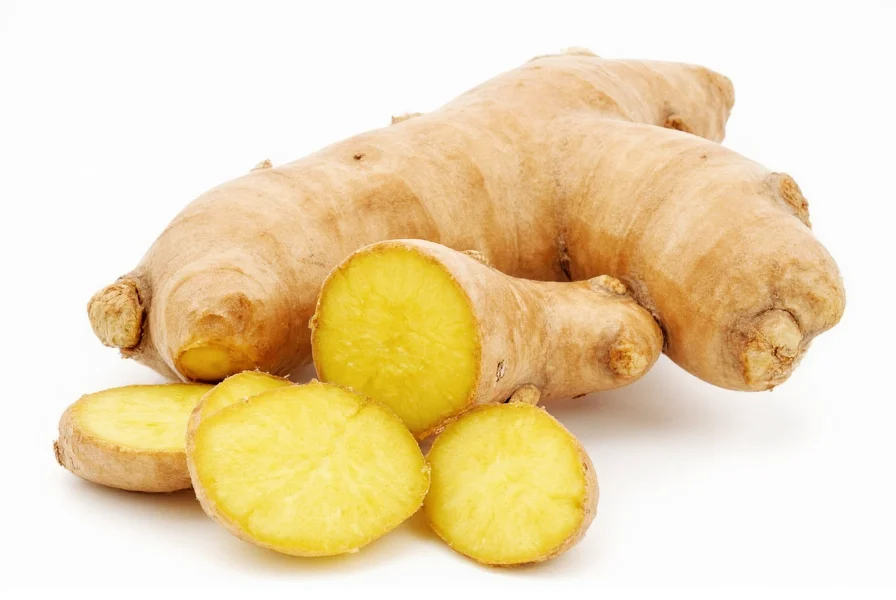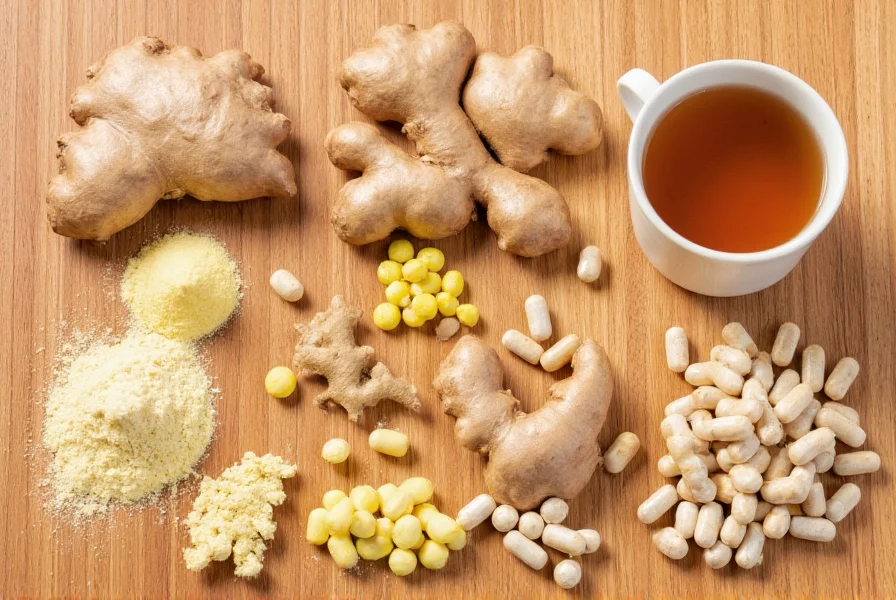Ginger (Zingiber officinale) has been used in traditional medicine systems for over 2,000 years. Modern research continues to validate many of these traditional uses, revealing specific mechanisms behind ginger's therapeutic effects. This comprehensive guide examines the scientifically supported ginger health benefits, optimal usage methods, and important safety considerations.
The Science Behind Ginger's Medicinal Properties
Ginger's therapeutic power comes primarily from bioactive compounds called gingerols and shogaols. These phytochemicals interact with multiple physiological pathways in the human body. Unlike many herbal remedies with limited research, ginger benefits are supported by over 200 clinical studies published in peer-reviewed journals. The National Center for Complementary and Integrative Health recognizes ginger as one of the better-studied herbal products.
| Ginger Compound | Concentration in Fresh Ginger | Primary Health Effects |
|---|---|---|
| Gingerols | 3-6 mg/g | Anti-inflammatory, antioxidant, nausea relief |
| Shogaols | 0.5-1.5 mg/g | Pain relief, enhanced bioavailability |
| Zingerone | 0.2-0.8 mg/g | Digestive support, antioxidant |
Top 5 Evidence-Based Ginger Benefits
1. Nausea and Vomiting Relief
Ginger stands as one of the most effective natural remedies for various forms of nausea. Multiple meta-analyses confirm that consuming 1-1.5 grams of ginger significantly reduces nausea symptoms. Research shows ginger benefits for:
- Morning sickness during pregnancy (with physician approval)
- Post-operative nausea
- Chemotherapy-induced nausea
- Travel sickness
A 2022 review in Nutrients found ginger reduced nausea intensity by 36% compared to placebo. The mechanism involves ginger's ability to block serotonin receptors in the digestive tract and brain.

2. Anti-Inflammatory and Pain Reduction
Ginger's anti-inflammatory properties rival some pharmaceutical options without the side effects. Studies demonstrate that regular ginger consumption reduces markers of inflammation like CRP and IL-6. Clinical trials show ginger benefits for:
- Osteoarthritis pain (reducing pain scores by 30% in some studies)
- Muscle soreness after exercise (25% reduction in DOMS)
- Menstrual pain (comparable to ibuprofen in some trials)
The Journal of Pain published research showing that 2 grams of ginger daily reduced muscle pain by 25% after eccentric exercise. Unlike NSAIDs, ginger works through multiple pathways including COX and LOX enzyme inhibition.
3. Digestive Health Enhancement
Ginger stimulates digestive enzymes and accelerates gastric emptying, making it valuable for various digestive concerns. Research confirms ginger benefits for:
- Functional dyspepsia (improving gastric emptying by 24-27%)
- Irritable bowel syndrome symptoms
- Preventing gastrointestinal complications
A study in the World Journal of Gastroenterology found ginger accelerated gastric emptying by 27% in healthy volunteers. This explains why many cultures consume ginger before or after meals to support digestion.
4. Cardiovascular Protection
Emerging research suggests ginger may support heart health through multiple mechanisms. Studies indicate ginger benefits for:
- Lowering LDL cholesterol (reductions of 10-15% in clinical trials)
- Reducing blood pressure (average 8 mmHg systolic reduction)
- Preventing blood clot formation
A 2020 meta-analysis in Complementary Therapies in Medicine concluded that ginger supplementation significantly improved lipid profiles in participants with metabolic disorders. The antiplatelet effects also suggest potential benefits for circulatory health.
5. Blood Sugar Regulation
Research shows promising ginger benefits for metabolic health, particularly for blood sugar control. Clinical studies demonstrate that ginger supplementation:
- Reduces fasting blood glucose by 10-12%
- Improves insulin sensitivity
- Lowers HbA1c levels in type 2 diabetes
A 2015 study in International Journal of Endocrinology and Metabolism found that 2 grams of ginger powder daily for 12 weeks significantly improved glycemic control in diabetic patients. The active compounds appear to enhance insulin release and improve cellular glucose uptake.
How to Use Ginger for Maximum Benefits
The effectiveness of ginger depends on proper usage. Different forms provide varying concentrations of active compounds:
- Fresh ginger root: Contains highest gingerol content; ideal for digestive issues (1-2 inches daily)
- Dried ginger powder: More concentrated shogaols; better for inflammation (1-1.5 grams daily)
- Ginger tea: Gentle option for nausea relief; steep 1-2 tablespoons fresh ginger in hot water
- Standardized extracts: Provide consistent dosing; look for 5% gingerols (250-500mg)
Timing matters for specific benefits. Consume ginger 30 minutes before meals for digestive support, or with meals for nausea prevention. For inflammation, consistent daily intake yields best results. The optimal daily dose ranges from 1-3 grams of fresh ginger or 250-1000mg of standardized extract, depending on the condition.

Safety Considerations and Potential Side Effects
Ginger is generally safe for most people when consumed in food amounts. However, some individuals should exercise caution:
- Those taking blood thinners should consult doctors due to ginger's antiplatelet effects
- Gallstone patients may experience increased bile production
- High doses (>5 grams daily) may cause heartburn or mouth irritation
- Pregnant women should limit to 1 gram daily without medical supervision
Unlike many pharmaceutical options, ginger rarely causes significant side effects at recommended doses. The most common issues involve mild digestive discomfort when consumed in excess. Always consult your healthcare provider before using ginger therapeutically if you have underlying health conditions or take medications.
Conclusion: Integrating Ginger Into Your Wellness Routine
Ginger's impressive range of scientifically supported health benefits makes it a valuable addition to most wellness routines. From reducing inflammation to supporting digestion and managing nausea, the evidence for ginger benefits continues to grow. Incorporating 1-2 grams of ginger daily through food, tea, or supplements can provide meaningful health advantages without significant risk for most people. As with any natural remedy, consistency and proper dosing determine effectiveness. Consult your healthcare provider to determine if ginger supplementation aligns with your specific health goals.
Frequently Asked Questions
What is the most effective way to consume ginger for nausea relief?
For nausea relief, consuming 1-1.5 grams of fresh ginger or 250-500mg of ginger powder 30 minutes before potential nausea triggers works best. Ginger tea made with 1-2 tablespoons of freshly grated ginger steeped in hot water provides quick relief. Clinical studies show this dosage reduces nausea intensity by 36% compared to placebo, with effects noticeable within 20-30 minutes.
How much ginger should I take daily for inflammation reduction?
Research indicates that 2 grams of ginger powder daily provides optimal anti-inflammatory effects. This amount has been shown to reduce inflammatory markers like CRP by 25-30% in clinical trials. Consistent daily intake for at least 4-6 weeks yields the best results for chronic inflammation conditions like osteoarthritis. Fresh ginger equivalent would be approximately 10 grams (about 1.5 inches of root).
Can ginger interact with blood pressure medications?
Yes, ginger may enhance the effects of blood pressure medications due to its mild hypotensive properties. Studies show ginger can lower systolic blood pressure by approximately 8 mmHg. If you take antihypertensive medications, monitor your blood pressure closely when adding ginger to your routine and consult your physician about appropriate dosing. Most people can safely consume culinary amounts (up to 1 gram daily) without concern.
Is fresh ginger more effective than dried ginger for health benefits?
The effectiveness depends on the specific health benefit. Fresh ginger contains higher levels of gingerols, making it better for digestive issues and nausea relief. Dried ginger has higher shogaol content due to the drying process, which provides stronger anti-inflammatory effects. For most therapeutic purposes, dried ginger powder offers more concentrated benefits, while fresh ginger works better for immediate digestive support. Both forms provide significant health advantages when used appropriately.
How long does it take to experience ginger's health benefits?
Timeframes vary by benefit: nausea relief typically occurs within 20-30 minutes; digestive improvements may be noticeable within hours; anti-inflammatory effects require consistent daily use for 4-6 weeks; blood sugar improvements show in 8-12 weeks of regular consumption. The Journal of Pain documented that muscle pain reduction became significant after 6 days of daily ginger supplementation. For chronic conditions, consistent long-term use yields the most substantial benefits.











 浙公网安备
33010002000092号
浙公网安备
33010002000092号 浙B2-20120091-4
浙B2-20120091-4